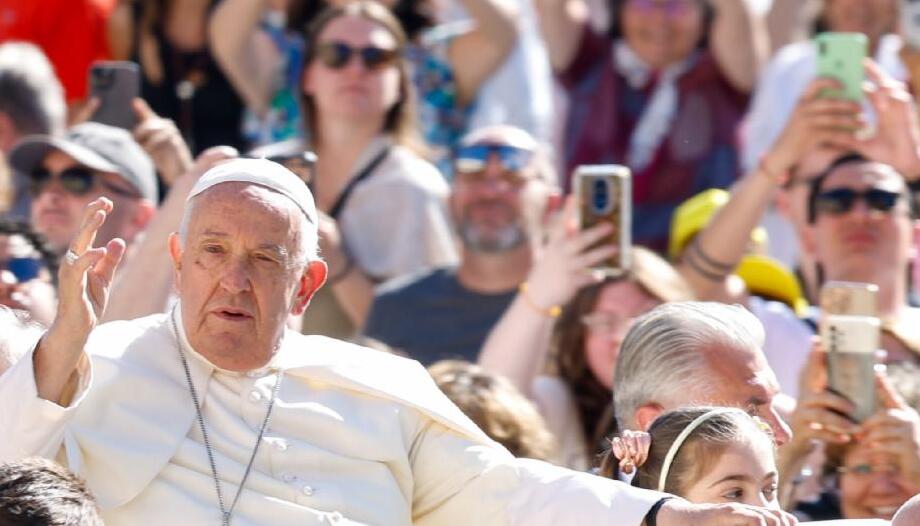"The feast of the Sacred Heart of Jesus and the memorial of the Immaculate Heart of Mary, which the Church is preparing to celebrate in the coming days, remind us of the need to correspond to Christ's redeeming love, and invite us to entrust ourselves with confidence to the intercession of the Mother of the Lord," Pope Francis said at the end of the Audience Wednesday, when he addressed the Romans and pilgrims.
He took the opportunity to announce that in September he will release a document on the devotion to the Sacred Heart of Jesus, whose party is celebrated this Friday, with reflections on St. Margaret Mary Alacoque and texts from the Magisterium.
He also recalled today's feast of "St. Boniface, apostle of Germany. Grateful for the long and fruitful history of faith in your lands, we invoke the Holy Spirit to keep faith, hope and charity always alive in you," he said in words addressed in a special way to the German-speaking pilgrims.
Holy Spirit, "Ruah", the power of God
Continuing with the new cycle of catechesis "The Spirit and the Bride," which is the Church, the Holy Father focused his reflection on the theme "The wind blows where it wills. Where the Spirit of God is, there is freedom" (Reading: Jn 3:6-8).
"We continue to reflect on the Holy Spirit. In the Bible it is called "Ruah", which means breath, breath, wind. The image of the wind refers us to the power of God, who has an unstoppable force, capable of transforming everything in its path," Pope Francis explained at today's Audience, in the second session of the catechesis dedicated to the Holy Spirit.
"The wind blows where it wants."
In addition to the power of the wind, the Gospel highlights another characteristic: freedom. "The wind blows where it wills, you do not know where it comes from or where it goes," Jesus says. This indicates that "the Holy Spirit cannot be confined or reduced to merely human theories or concepts," the Pontiff pointed out.
On the other hand, St. Paul affirms that "where the Spirit of the Lord is, there is freedom," that is, that the Spirit of God makes us truly free. "But freedom can be understood in different ways, it can become a pretext for doing whatever one wants; for this reason, the Apostle makes it clear that Christian freedom consists in freely adhering to the will of God. And this is expressed in love and service to others, as Jesus taught us with his own life," he added.
The Pope then stressed that in this month dedicated to the Heart of Jesus, "let us ask the Holy Spirit to help us to live with the freedom of the children of God, loving and serving with joy and simplicity of heart. May the Lord bless you and the Holy Virgin protect you".
The Holy Spirit cannot be "institutionalized".
In his reflection on the Holy Spirit and freedom, Francis recalled that "once again, to discover the full meaning of the realities of the Bible, we must not stop at the Old Testament, but come to Jesus. Along with power, Jesus will highlight another characteristic of the wind, that of its freedom. To Nicodemus, who visits him at night, he solemnly says: "The wind blows where it wills, and you hear its voice, but you do not know where it comes from or where it goes: so is everyone who is born of the Spirit" (Jn 3:8).
"The wind is the only thing that cannot be restrained, cannot be "bottled up" or boxed up. To try to enclose the Holy Spirit in concepts, definitions, theses or treatises, as modern rationalism has sometimes tried to do, is to lose him, to annul him or reduce him to the human spirit pure and simple. There is, however, a similar temptation in the ecclesiastical sphere, and that is to want to enclose the Holy Spirit in canons, institutions, definitions. The Spirit creates and animates institutions, but he himself cannot be "institutionalized," the Holy Father added.
"The wind blows "where it wills" (1 Cor 12:11). St. Paul will make this the fundamental law of Christian action: "Where the Spirit of the Lord is, there is freedom" (2 Cor. 3:17). This is a very special freedom, very different from what is commonly understood. It is not freedom to do what one wants, but freedom to do freely what God wants! Not freedom to do good or evil, but freedom to do good and to do it freely, that is, by attraction, not by compulsion. In other words, the freedom of sons, not of slaves", he concluded.
To the Poles: freedom, a compromise
I cordially greet the Poles," the Pope also said. "In these days you are commemorating the anniversary of the first apostolic journey of John Paul II to his homeland and of his prayer to the Holy Spirit to descend and renew the face of the earth, of your land, and it has been renewed. You have regained your freedom. Do not forget, however, that the freedom that comes from the Spirit is not a pretext for the flesh, as St. Paul says, but a commitment to grow in the truth revealed by Christ and to defend it before the world. I bless you from my heart.







